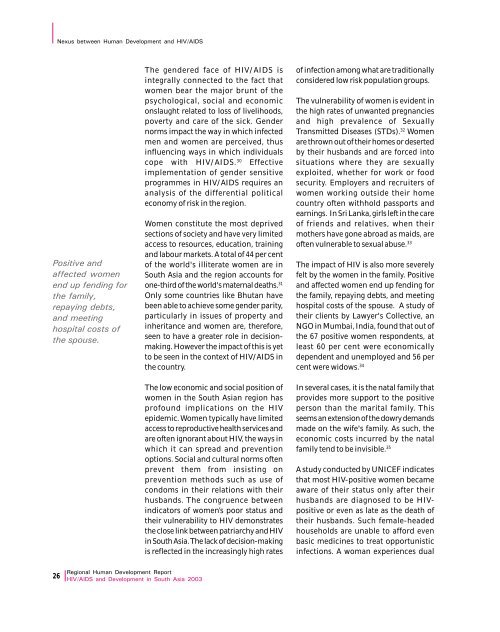Download Report - UNDP Asia-Pacific Regional Centre - United ...
Download Report - UNDP Asia-Pacific Regional Centre - United ...
Download Report - UNDP Asia-Pacific Regional Centre - United ...
You also want an ePaper? Increase the reach of your titles
YUMPU automatically turns print PDFs into web optimized ePapers that Google loves.
Nexus between Human Development and HIV/AIDSPositive andaffected womenend up fending forthe family,repaying debts,and meetinghospital costs ofthe spouse.The gendered face of HIV/AIDS isintegrally connected to the fact thatwomen bear the major brunt of thepsychological, social and economiconslaught related to loss of livelihoods,poverty and care of the sick. Gendernorms impact the way in which infectedmen and women are perceived, thusinfluencing ways in which individualscope with HIV/AIDS. 30 Effectiveimplementation of gender sensitiveprogrammes in HIV/AIDS requires ananalysis of the differential politicaleconomy of risk in the region.Women constitute the most deprivedsections of society and have very limitedaccess to resources, education, trainingand labour markets. A total of 44 per centof the world's illiterate women are inSouth <strong>Asia</strong> and the region accounts forone-third of the world's maternal deaths. 31Only some countries like Bhutan havebeen able to achieve some gender parity,particularly in issues of property andinheritance and women are, therefore,seen to have a greater role in decisionmaking.However the impact of this is yetto be seen in the context of HIV/AIDS inthe country.The low economic and social position ofwomen in the South <strong>Asia</strong>n region hasprofound implications on the HIVepidemic. Women typically have limitedaccess to reproductive health services andare often ignorant about HIV, the ways inwhich it can spread and preventionoptions. Social and cultural norms oftenprevent them from insisting onprevention methods such as use ofcondoms in their relations with theirhusbands. The congruence betweenindicators of women’s poor status andtheir vulnerability to HIV demonstratesthe close link between patriarchy and HIVin South <strong>Asia</strong>. The lack of decision-makingis reflected in the increasingly high ratesof infection among what are traditionallyconsidered low risk population groups.The vulnerability of women is evident inthe high rates of unwanted pregnanciesand high prevalence of SexuallyTransmitted Diseases (STDs). 32 Womenare thrown out of their homes or desertedby their husbands and are forced intosituations where they are sexuallyexploited, whether for work or foodsecurity. Employers and recruiters ofwomen working outside their homecountry often withhold passports andearnings. In Sri Lanka, girls left in the careof friends and relatives, when theirmothers have gone abroad as maids, areoften vulnerable to sexual abuse. 33The impact of HIV is also more severelyfelt by the women in the family. Positiveand affected women end up fending forthe family, repaying debts, and meetinghospital costs of the spouse. A study oftheir clients by Lawyer's Collective, anNGO in Mumbai, India, found that out ofthe 67 positive women respondents, atleast 60 per cent were economicallydependent and unemployed and 56 percent were widows. 34In several cases, it is the natal family thatprovides more support to the positiveperson than the marital family. Thisseems an extension of the dowry demandsmade on the wife's family. As such, theeconomic costs incurred by the natalfamily tend to be invisible. 35A study conducted by UNICEF indicatesthat most HIV-positive women becameaware of their status only after theirhusbands are diagnosed to be HIVpositiveor even as late as the death oftheir husbands. Such female-headedhouseholds are unable to afford evenbasic medicines to treat opportunisticinfections. A woman experiences dual26<strong>Regional</strong> Human Development <strong>Report</strong>HIV/AIDS and Development in South <strong>Asia</strong> 2003
















